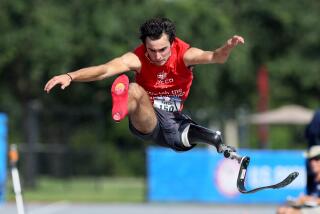Flag Bearer Is Up on Current Events
- Share via
SYDNEY, Australia — On the eve of the opening ceremony, the U.S. team lighted the Olympic spirit today with an announcement that felt like a medal.
Our swiftest will be led into Olympic Stadium Friday by a man who cannot run.
Our strongest will be led by a man whose knees throb with pain.
The glamorous will be led by a man best known for his scars.
On Cliff Meidl’s back. On his shoulders. On a right foot that is missing two toes.
“You look at him with his shirt off and with shorts on and you ask, ‘What happened?’ ” said training partner Chris Ball.
What happened today was, Hawthorne’s Meidl, a kayaker, was chosen from among 603 athletes to carry the U.S. flag during the traditional march into the stadium.
Fourteen years after an electrical accident caused doctors to recommend the removal of his legs.
One enduring symbol toted by another.
For all its hype and commercialism and topless photos, the U.S. team got this one right.
“I was watching TV when our captain came into the room shouting, ‘You won! You won!’ ” recalled Meidl, 34. “I thought, ‘No way! What are the odds of this happening!”
How does infinity-to-one sound?
“It’s beyond my dreams,” said Meidl.
Not to mention any shreds of reality.
Note first that this is not a full-time athlete like Marion Jones or Vince Carter.
This is a full-time financial analyst who works in El Monte while living with his father in Hawthorne.
Training? At dawn in Newport Beach.
“With that commute, I don’t know how he does it,” said Ball. “But he always shows up.”
Note now that this is not a world star like those on the U.S. women’s soccer or swimming teams.
This is a guy who only qualified for the Olympics by the equivalent of one length.
“The hair of my chinny-chin-chin,” Meidl said.
Now for the startling stuff.
Cliff Meidl became a sprint kayaker only because, well, you don’t need your legs.
The first time he paddled a canoe for competitive purposes, he was lifted into it.
“When I could no longer use my legs for sports, I was looking to get into something with my upper body . . . and kayaking was it,” he said.
His story starts in Hawthorne in 1986.
Meidl, a 20-year-old apprentice plumber, was jackhammering through concrete when he hit three electrical cables.
He was thrown out of the ditch and knocked unconscious. He then slid back into the ditch and his legs came into contact with the cables.
Witnesses said he was jolted for more than 30 seconds. Experts figure he received more than 30,000 volts.
He went into cardiac arrest three times.
He spent three weeks in a burn center.
Parts of his knees had disintegrated. One toe was blown off, another was amputated because of infection.
Doctors wanted to take his legs. His parents refused.
“We just couldn’t see giving in to that,” recalled his father, Helmut. “That’s the only way I can explain it.”
At first, Cliff couldn’t walk. It was months before he was able to even use crutches. A new form of plastic surgery was used to cover the burned parts of his knees.
“The doctor came out and said, ‘Cliff, I’ve done all I can do, the rest is up to you,” recalled his father. “From that day on, Cliff never took no for an answer.”
One day, at 19, he told his father he wanted to go to the water.
“He said, ‘I can’t use my legs, but rowing involves the upper body, so maybe it’s something I can do,’ ” said Helmut.
Was it ever! Cliff began rowing and swimming and doing everything but running.
“Hours in the water,” Cliff recalled. “Hours and hours.”
He qualified for the 1996 Games in Atlanta. Somebody took pictures of him as he marched in the opening ceremony with hundreds of other U.S. teammates.
He saved those pictures.
“I look at myself and I can see what it meant to me,” he said. “I’m smiling as big as I’ve ever smiled. I remember the feeling.”
That feeling is back, only multiplied beyond feeling.
“I can see myself getting emotional,” Meidl said. “I am proud. Honored. Humbled.”
And alone.
Because of an eligibility controversy surrounding a teammate, Meidl’s family was worried that his boat would be declared ineligible, so they didn’t make the trip.
That controversy is expected to be cleared up by Friday. But by then, if they want to see him carry the flag in person, it will be too late.
“We tried,” said his father, an airline customer service agent. “But it is impossible.”
Cliff Meidl understands. He will carry the flag for them.
He will carry the flag for everyone who, like him, could never dream of carrying it.
In a way, he will carry the flag for all of us.
“I will be as strong as I can,” Cliff Meidl said, which will be plenty strong enough.
*
Bill Plaschke can be reached at his e-mail address: bill.plaschke@latimes.com.
More to Read
Go beyond the scoreboard
Get the latest on L.A.'s teams in the daily Sports Report newsletter.
You may occasionally receive promotional content from the Los Angeles Times.







